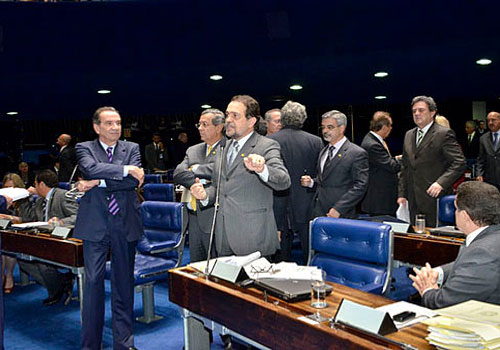
Brazil's Senate approves national Post's global expansion plans
New legislation that could potentially see Brazil’s national Post Office becoming the next Deutsche Post DHL has been passed by the nation’s Senate. After nearly two hours of debate on Wednesday, the full Senate voted on Provisional Measure 532/11, with 43 of the 55 senators in favour.
The legislation aims to modernise the country’s Post Office and allow it to expand into new services – but also to buy up private sector companies and operate in territories outside Brazil.
With the law passed by Brazil’s lower house last month, it now needs only to be signed off by President Roussef.
Among its provisions, the legislation would give the Brazilian Post and Telegraph Company (ECT) powers to acquire control or full ownership of other companies, and establish offices in foreign companies.
ECT is aiming to use its considerable resources to compete on the global stage in the way that has allowed other national posts, most notably the likes of DHL-owners Deutsche Post, to thrive.
The platform for its global expansion is a company that currently has more than 107,000 staff, more than 80,000 engaged in delivery or processing activities, along with a fleet of more than 17,000 vehicles.
ECT handles around 35m mailpieces each day, processing 8.8bn pieces in 2010, and earning a $8.09bn annual revenue last year.
Privatisation

Wednesday’s Senate debate saw controversy over fears that postal services could be sold off into the private sector
Wednesday’s debate, which started out with a protest by a group of senators regarding the huge number of legislative reforms the Brazilian government is trying to pass at the moment, did generate some controversy.
The key concern was the possibility that the reforms could open the door to privatisation.
Once again in the passage of the postal reform legislation, there was a protest by postal workers against privatisation, repeating their showing at the Senate debate as had been seen in the Chamber of Deputies last month, although this time the demonstrations were milder.
Brazil’s unions warned that allowing ECT to set up subsidiaries could also allow it to sell off subsidiaries under the current postal bylaws, effectively privatising parts of the company.
During the debate, the protest message was taken up by opposition senators, who accused the government of trying to pass an “interim” measure that merely prepared the way for future privatisation.
Randolfe Rodrigues (PSOL-AP) said: “This is clearly paving the way for privatising this important national company.”
There were also fears by some that the current socialist government’s attempts to use ECT “politically” to improve social welfare of Brazilians would end up hurting the company’s service efficiency.
Restrictions
In order to ease some of the concerns, the Senate added amendments to restrict powers for establishing new subsidiaries in the monopoly area of domestic deliveries. The changes mean that management functions for ECT at a regional level may only be carried out by permanent employees of the Post.
Brazil’s Congress will have to be notified of any new subsidiaries set up, or companies acquired, within 30 days of a decision by the ECT board.
Senator Humberto Costa, leader in the Senate for the ruling Worker’s Party (PT) said there were no openings for privatisation in the reforms.
“The company will have a wider scope in their work without losing the postal monopoly, and this is extremely important,” he said, adding that the new legislation would “preserve the condition of the postal monopoly in Brazil – guaranteed”.
As well as new corporate-style powers and structure, this week’s Senate debate looked at the new services that ECT could take up, which include provision of more integrated logistics services, new financial services and electronic forms of communication.
“Victory”
Following Wednesday’s approval by the Senate for the postal reform bill, ECT celebrated the changes that it said will mean modernising and strengthening its services.
The company stressed that the new law will mean the Post Office remaining a “100% public” organisation “in a more modern, competitive and profitable postal market”. The company said it now has the means to compete on an equal footing with large multinational logistics businesses.
The expansion of its postal activities represents a “milestone” in the history of the Brazilian postal service, it said, adding that the transformation fitted in with the wider Brazilian government effort to modernise the country.
ECT president Wagner Pinheiro de Oliveira said: “Our response will be accelerating the development of the company and the general improvement of our services. The approval is a victory for the company and all employees of ECT.”












